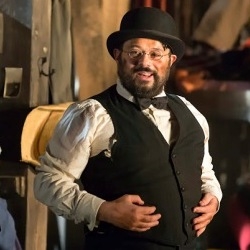Paul Bunyan (ETO)
Another rarity from English Touring Opera as Benjamin Britten’s first stage work heads out on tour
If Candide is a musical that thinks it’s an opera, then Paul Bunyan is an opera with Broadway pretensions. Like Bernstein's show and Kurt Weill’s Street Scene, Benjamin Britten’s first stage work was hobbled from birth by straddling more than one clearly-definable art form, and the failure of its first production (in 1941) would sting the thin-skinned composer into withdrawing it for the next three decades.

© Richard Hubert Smith
In fact, the shortcomings of this operetta (for want of a better word) are down to WH Auden’s libretto, which loads dense imagery and lumpish liberal messages onto a sweetly ingenuous melodic structure. Auden would later apologise to Britten for his effort, but the damage was done.
We are left with an entertainment that is certainly flawed but is also charming, amusing and laden with unexpected beauties. For much of its duration Paul Bunyan is a choral work without a chorus, just English Touring Opera’s 23-strong team of solo singers giving it their all.
It is also, notoriously, a show without a hero, because the eponymous giant (a benevolent lumberjack) is never actually seen. Instead, Damian Lewis provides his voice – pre-recorded, but expertly delivered and seamlessly integrated – whenever he looms.
The physical absence of its protagonist accentuates the tale’s credentials as an American creation myth, for Bunyan is the wise demigod who presides over the birth-pangs of a nation. "It is America," he observes at the outset, "but not yet".
Director Liam Steel‘s decision to set Paul Bunyan inside a lumber-workers’ communal cabin, and to have the whole improbable tale enacted by the logging gang, makes admirable dramatic sense, but it comes at a price. A flight of fancy needs room to spread its wings; here there is none. Anna Fleischle’s detailed set is festooned with so much naturalistic clutter – beds, tables, tools of the lumberjack’s trade – that the audience’s imagination has nowhere to go. Worse, the meticulously choreographed movements (a Steel hallmark) are too cramped to make their mark and the energy feels miniaturised.
Factor in an excess of moodiness from lighting designer Guy Hoare (‘interior: evening’ seems to be the default state) and the production’s capacity for joy is attenuated.
On the musical side, however, ETO has hit the jackpot with the best-sung rendition of the work I’ve yet encountered. It’s miles better than the Royal Opera’s over-sung version of 1999 and more generally polished than last summer’s exemplary staging by British Youth Opera. In a company show with no weak links every singer deserves praise, though if pressed I’d have to single out Mark Wilde‘s Johnny Inkslinger, Abigail Kelly‘s dog Fido and Caryl Hughes who, as Bunyan’s daughter, Tiny, sings the heart out of the achingly beautiful song/aria ‘Mother, O Mother’.
The eclectic score – a blend of pure-bred Britten and pastiche American folk ballads and blues – is expertly rendered by Philip Sunderland and the ETO musicians, though I suspect it will sound even better out on tour, where the orchestra for this and for King Priam is due to decamp from its present location behind the stage and into a normal pit.
– Paul Bunyan joins King Priam and The Magic Flute on a national tour throughout March, April and May 2014. Details here.












